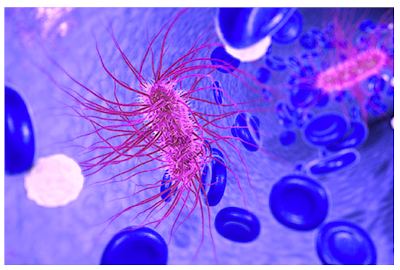Escherichia coli (E. coli) is a gram-negative bacterium that is highly diverse; there are an enormous number of types and strains with different characteristics. Most types of E. coli occur as normal inhabitants of the intestines of animals and do not cause disease. Some, however, can cause devastating illness, such as E. coli O157:H7.
 As the most notorious Shiga toxin-producing E. coli (STEC) serotype in the United States, E. coli O157:H7 is a common cause of bloody diarrhea and the most common cause of hemolytic uremic syndrome (HUS), a severe complication that involves kidney failure and is fatal in approximately 5-6% of cases. E. coli O157:H7 causes an estimated 63,153 illnesses, 2,138 hospitalizations, and 20 deaths in the United States each year due to foodborne transmission alone.
As the most notorious Shiga toxin-producing E. coli (STEC) serotype in the United States, E. coli O157:H7 is a common cause of bloody diarrhea and the most common cause of hemolytic uremic syndrome (HUS), a severe complication that involves kidney failure and is fatal in approximately 5-6% of cases. E. coli O157:H7 causes an estimated 63,153 illnesses, 2,138 hospitalizations, and 20 deaths in the United States each year due to foodborne transmission alone.
Beef is the most common vehicle of foodborne E. coli O157:H7 outbreaks, accounting for almost half of outbreaks. Most beef outbreaks are associated with ground beef, but other types of beef products have also been implicated. Leafy greens (e.g., romaine lettuce, iceberg lettuce, spinach) are the second most common cause of E. coli O157:H7 outbreaks; this has been an important and difficult food safety problem for more than two decades.
People can acquire STEC infection from food, recreational water (swimming), drinking water, contact with animals (especially cattle, goats, and sheep), and contact with a person who is or has recently been ill. Sometimes circumstances are beyond people’s control, and it is impossible to prevent becoming infected during the course of day-to-day life. However, there are certain things that can be done to reduce risk. Rinse fresh fruits and vegetables under running water without soap, bleach, or commercial produce washes. Do not wash meat, poultry, eggs, or bagged produce marked “pre-washed.” Wash your hands often, especially before, during, and after preparing food, after handling raw meat, before eating, after using the toilet, and after changing diapers or cleaning up a child who has used the toilet.